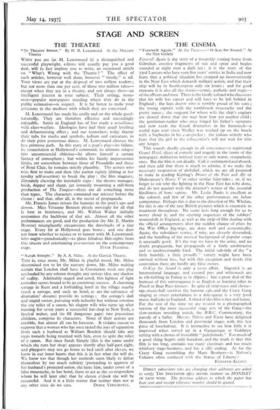THE CINEMA
" Farewell Again." At the Plaza—" 0-Kay for Sound." At the New Gallery Farewell Again is the story of a troopship coming home from Gibraltar, emotive fragments of sun and spray and bugles sounded at night over a dark sea ; it is the story of the 23rd Lancers who have seen five years' service in India and now learn that a political situation has cropped up inconveniently in the Near East which demands military action, and that their ship will be in Southampton only six hours ; and for good measure it is also all the stories—comic, pathetic and tragic— of the officers and men. There is the kindly colonel who discovers that his wife has cancer and will have to be left behind in England ; the lean doctor who is terribly proud of his sons ; the young captain with the toothbrush moustache and the pretty nurse ; the sergeant for whose wife the ship's engines are slowed down that she may bear him yet another child ; the gentleman-ranker who once forged his father's signature and now reads the Greek dramatists in his hammock—a useful type ever since Shelley was washed up on the beach with a Sophocles in his coat-pocket ; the jealous orderly who fears that the girl in the tobacconist's will not wait for him any longer.
This sounds deadly enough in all conscience—a regimental Grand Hotel, slices of comedy and tragedy in the terms of the newspaper, militarism without tears or only warm, sympathetic ones. But the film is not deadly. Call it sentimental and absurd, and then add that there is much to admire, if we make the necessary suspension of disbelief, which we are all prepared to make in reading Kipling's Drums of the Fore and Aft or Shakespeare's Henry V or other similar fairy-tales ; or, if we forget to ask why the fighting in the Near East has to be done, and do not quarrel with the director's notion of the essential kindliness of home sapiens. Mr. Leslie Banks is excellent as the colonel, and few of the other performances are below competence. Perhaps this is due to the direction of Mr. Whelan, for this is one of the rare British pictures which is cinematic in treatment throughout. No scene lasts long enough for us to worry about it, and the opening sequences of the soldiers' womenfolk in England, as well as the strip of film dealing with the official arrangements after the sudden change of plans by the War Office big-wigs, are done well and economically. Again, the subsidiary stories, if trite, are cleverly dovetailed, and the handling of the musical background of popular songs is unusually good. It's the way we have in the army, and no doubt propaganda, but propaganda of a fairly unobtrusive and so unobjectionable kind. The initial sub-title of the " a little humbly, a little proudly " variety might have been omitted without loss, but with this exception and inside this convention there are hardly any false moves.
0-Kay for Sound is only a so-so effort. Slapstick is an international language, and custard pies and whitewash are as rib-tickling in Ealing as in Algiers ; but a great deal of the humour of this extravaganza is as English as hunting jokes in Punch or Boat Race favours. In spite of strip-tease and chorus- tap, music-hall survives the hansom cab, and the Crazy Gang singing as street entertainers to a dole-queue is a very good music-hall joke in England. A third of this film is fast and funny. For the rest of the time we are treated to a photographed version of the most successful stage acts of the Gang—the slow-motion wrestling match, the B.B.C. Commentary, the parody of a ballet. Messrs. Nervo and Knox have delighted thousands from London and provincial stages with this last piece of knockabout. It is instructive to see how little it is improved when served up in a Gargantuan or Goldwyn setting with a chorus of incredible " pulchritude." Too much of a good thing begets only boredom, and the truth is that this film is too long, contains too many chestnuts and too much whiskery stage-business, and has a silly ending. As for the Crazy Gang resembling the Marx Brothers—is Nelson's Column often confused with the Statue of Liberty ?
KENNETH ALLOTT.














































 Previous page
Previous page